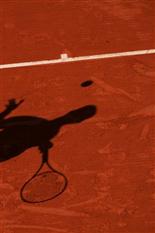 These four tournaments are the most prestigious and most difficult to win in the Grand Slam. They take place over a two-week period following the qualifying rounds. The Wimbledon Championships, which was created in 1877, is the oldest tennis tournament in the world. Lawn tennis was added to the activities of the private club founded in 1868 called All England Lawn Tennis and Croquet Club; Gentlemen’s singles was introduced in 1877. From a field of 22, Spencer Gore (United Kingdom), aged 27, won the tournament attended by 200 privileged spectators who each paid 1 shilling to watch the final.
These four tournaments are the most prestigious and most difficult to win in the Grand Slam. They take place over a two-week period following the qualifying rounds. The Wimbledon Championships, which was created in 1877, is the oldest tennis tournament in the world. Lawn tennis was added to the activities of the private club founded in 1868 called All England Lawn Tennis and Croquet Club; Gentlemen’s singles was introduced in 1877. From a field of 22, Spencer Gore (United Kingdom), aged 27, won the tournament attended by 200 privileged spectators who each paid 1 shilling to watch the final.
Ladies’ singles was added in 1884 and was won by Maud Watson (United Kingdom).
It has become famous on account of its location, unique surface and traditions:
- Male and female players are required to adhere to a strict, all-white dress code.
- Players are not seeded according to their world ranking, rather the members of the All England Club seed the players, depending on their results and their personality. This tradition is often challenged.
- Trophies are always awarded by the Duke and Duchess of Kent. No cheques are awarded in front of spectators.
- The winner of the previous year always opens the tournament on No. 1 court at 2pm.
- The grounds at Wimbledon are free of advertising.
- Winners are given life membership to the All England Club
- During the final, male and female players may use a helper to carry all their things on court.
With 128 players in 2011, crowd numbers are higher than in 2010, reaching 489,946 people for the final.
The world’s greatest players attend all Grand Slam tournaments. None of them miss this third major tournament of the year. As is the case for most tournaments, ardent tennis fans can follow all the matches broadcast on television, radio and other media.
You can sit back in the comfort of your own home to watch the day’s match highlights, or a press conference with one of your favourite players. If you are Spanish and you do not understand English how can you understand what is being broadcast? Through interpreting. But who can ensure this tricky task? Interpreters can.
CG Traduction & Interprétation interpreters can provide a seamless link in press rooms. In such situations, interpreters need to be fully acquainted with the world of tennis and capable of adapting their vocabulary to render each player’s way of speaking, feelings and personality. Ultimately, all this work will be used by journalists reporting on the tournament: a Spaniard will not talk about the tournament with the same feelings as an Englishman or a Frenchman… The next time you watch a match or hear your favourite player speak, spare a thought for the person who, behind the scenes, is working hard to interpret what is being said!


